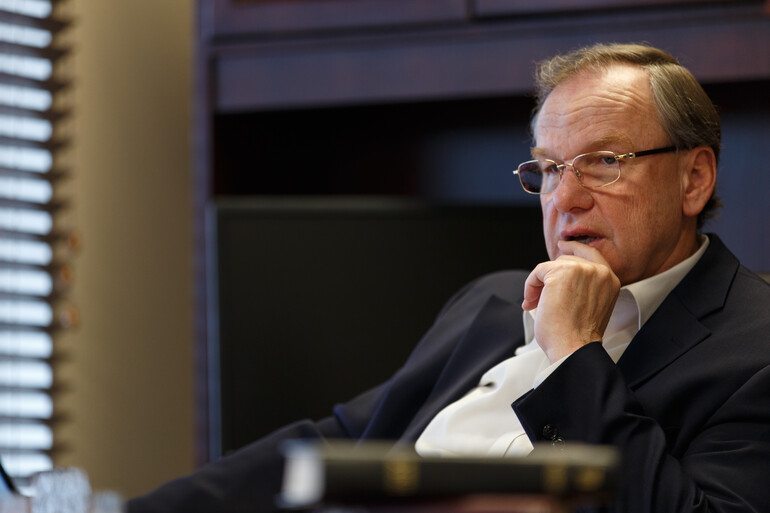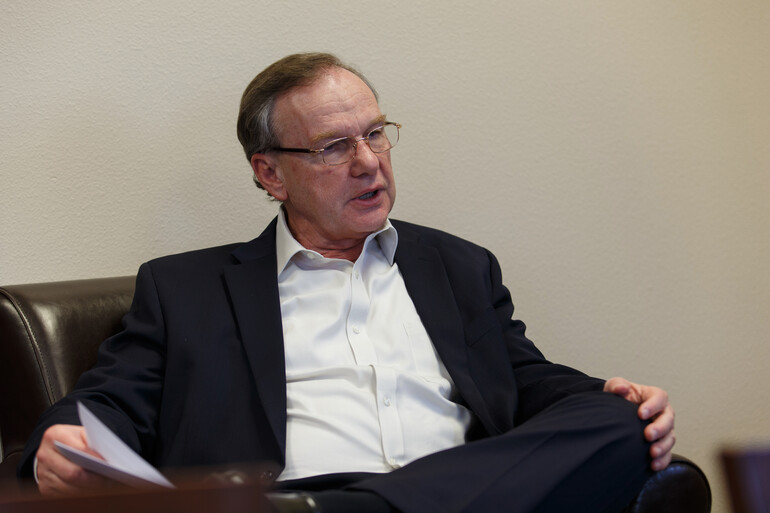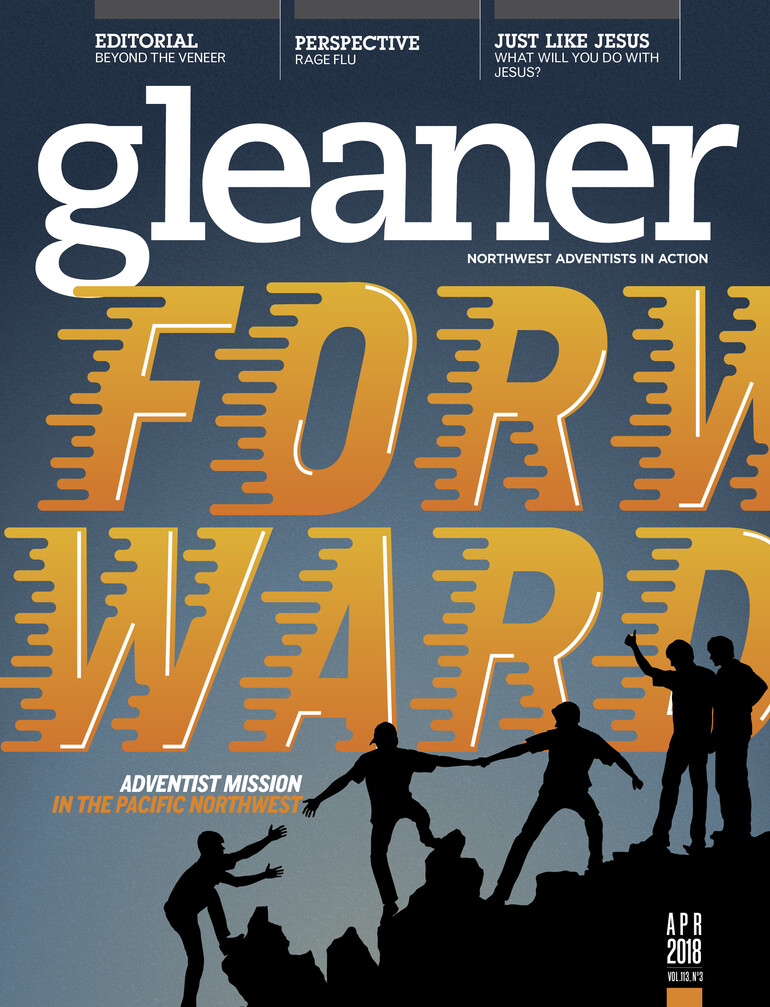North Pacific Union Conference (NPUC) leaders have adopted four priorities that undergird the Adventist mission in the Pacific Northwest: To reach our territory with the distinctive, Christ-centered, Seventh-day Adventist message of hope and wholeness. The four areas are: 1) Young Adult Engagement; 2) Unity in Christ; 3) Total Member Involvement; and 4) Leadership Development. These will become the core measurement of progress through the year 2021, when the next NPUC constituency session is scheduled. The Gleaner asked John Freedman, NPUC president, to further clarify how these areas may impact directions for Northwest churches in the months ahead.
Gleaner: For years church leaders have described young people as “the future of the church.” Does Priority No. 1 — Young Adult Engagement — change that to the present tense?
John Freedman: Yes! Let's stop just wringing our hands, kicking this down to some future spot in the road. We have the ability to stop simply quoting statistics and start being active about making young people a priority now. Our churches and congregations are growing older. So our top priority is to intentionally move forward together in “growing young.” It's possible to make decisions today that will proactively engage our young people with Christ and the church. Together we can identify and implement processes that will help our churches to become generationally revived. Our young people often feel very much unheard. It’s long past time for us to listen carefully and act intentionally. Our local conferences are on board with this, and we will encourage each step in this direction.
G: Some of our more experienced members may worry that young people more actively engaging with the church will cause ill-advised changes — that style may replace substance.
JF: From my experience, young people are not about style over substance. They’re not against our fundamental beliefs. But they do want to be a part of beliefs that translate into action, real worship, tangible outward-focused service. Positive changes will not damage our church. The young people I’ve dialogued with want what we all long for — an authentic, effective spiritual relationship with Christ. And, frankly, they’re telling us, “We’re not seeing this in our churches.” This should cause us to pause and get on our knees. So how do we rediscover this together? That is now our focus. Church is more than what happens for a couple hours on Sabbath morning. We can become a relational, life-changing, community-engaging body of believers that will change the world for Jesus. When I’ve seen this in action, inevitably it engages all ages together. And, you know, this is a two-way street. This emphasis is not about every one else simply backing off and handing over the reins to young people. They want and need mentoring from the wisdom and experience of those who have been on this journey of faith much longer than them. We all have much to learn together through this process of "growing young."
G: Do young people really want to sit on church-related committees?
JF: Well, they certainly don’t want to spend time in meetings that are just talk or eternally obsessed with infrastructure. Some of that is of course important, but it should not be our primary focus. They’re not mainly interested in remodeling bathrooms but in reaching out in Christ’s love where it can make a difference in our communities. Once they’re included in all of our plans and processes, and we begin to listen, we will likely discover amazing new ways of effectively fulfilling our common mission together.
G: Tithes and offerings, which have been systemic for many of our older members, support the mission and outreach of our church — both around the world and locally. Are young people willing to step up to the plate (no pun intended) to financially support church mission?
JF: Yes. But, unless we embrace the need for “growing young” as a church, we’ll never know because the young people won’t be around to step up. Those I’ve talked to will support a budget that in clear, demonstrable ways moves mission forward. I’ve watched the commitment that our student missionaries and other young people show in ministry throughout the world. I believe when our younger age groups see opportunities to serve that make sense to them they will contribute in ways that may surprise some of our veteran members.
G: In regard to Priority No. 2 — Unity in Christ — most of us would acknowledge that there is currently a crisis of unity within our church with serious questions and concerns over gender, equality, beliefs, policies, etc. We have strong differences of opinion on these issues within our Northwest churches and members. How do we find God’s way forward without splitting the church?
JF: I talk to earnest and committed members all around the Northwest who find themselves on different sides of important issues. They love this church and God's unique message and mission. But sometimes we have anchored our unity in the wrong place. Unity is possible when we surrender our collective wills to Jesus. Our differences are too often expressed in emotional language that disrespects what could otherwise be a healthy diversity. Diversity and unity are not in opposition if we find our common ground in being the body of Christ — all of our different parts working together for His glory. This is an intentional choice that each of us can make. We have to want His glory more than we want ours — and human nature is not naturally inclined to give up the throne. We’ll pray that God’s Spirit will move among us to bring the unity in Christ that we are not capable of by ourselves.
G: How can we move past painting each other with broad brush strokes — young adults, baby boomers, liberal, conservative — that are too-often inaccurate?
JF: I've found it's possible when we put our focus where it belongs — on Jesus. Sports fans often complain loud and long about what their respective teams “should’ve” done to win a game. When we’re on the sidelines, there’s plenty of time to critique those actually out on the playing field. Jesus got labeled. But Ellen White reminds us that the criticism didn’t stop Him from mingling with people as one who desired their good. What an important model for us to follow. Let’s skip the labels and learn to know each other as fellow travelers on a journey with Jesus. None of us are perfect; we are all learners. And when we actively join our efforts in common mission, we will find our greatest joy in doing things His way.
G: What is the key to creating Spirit-led, Christ-centered, truth-filled, people-loving congregations that are multigenerational?
JF: Love Christ first of all and allow Him to bring us together. We are called to love Him with all of our heart, mind and soul, but also to love one another as He has loved us. Those two things go together. I don’t want to create any political allusions here, but we have too often seen our role as building walls to protect the integrity of God’s church. That’s not our commission. It is to go beyond the four walls of our churches, make disciples and teach them His ways.
G: You are supportive of Pastor Ted Wilson’s call for Total Member Involvement (TMI) throughout our world church. What does that mean to you and for us here in the Northwest in practical, everyday ways?
JF: It essentially means that every member every day will use God’s Holy Spirit-given gifts in ministry for Christ. Our third priority, TMI, mirrors that of our world church and envisions all of us working together to uplift the name of Jesus. Our commission is do far more than just creating a dynamic church program for three hours on Sabbath morning or whipping up an amazing potluck. All those things have a part to play in our mission, but that mission will ultimately have us all working together for one main purpose — creating community connections in order reach others with the gospel.
G: A significant percentage of our current church administrative and pastoral leadership is due or past due for retirement. Yet our system has been ineffective at mentoring and training younger individuals ready to step in to those roles. What are we doing to change that trend?
JF: Well, I'm passionate about a fourth priority within our Northwest mission — Leadership Development. We can strategically identify men and women with real potential for leadership and create training tracks and other opportunities for leadership growth. This will require a lot of new coordination that is not currently in place, but it is critical for our church. Adventist Health has successfully modeled this plan, and it’s something I believe we should adapt at every level of our church.
G: It seems clear you believe we must prepare ourselves for positive changes in some of the ways we are currently structured to carry out our God-given mission. How optimistic are you that these changes will happen?
JF: Bill Liversidge would always ask, “How big is our God?” It’s a great question. I believe our God is bigger than any problem or issue we face, and He will get His church to where we need to be. Prayerfully seeking Jesus and asking for the leading of the Holy Spirit — not praying against the “other side” but for God to bring us into unity — will put us in a position to receive God-sized miracles. I believe we have at times made the mistake of thinking we need to defend the church because God is not able to. We’re inclined to take sides, judge others and fight for our own opinions. Instead, we need to love Christ supremely and other people as He has loved us and then trust God to nurture and lead His church. By being still in matters beyond our calling, we clear the way for Christ to bring victory in His time and in His way.










